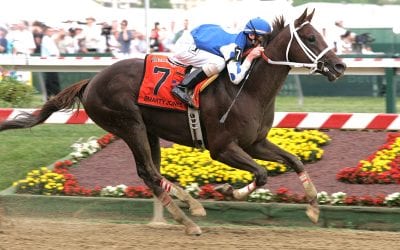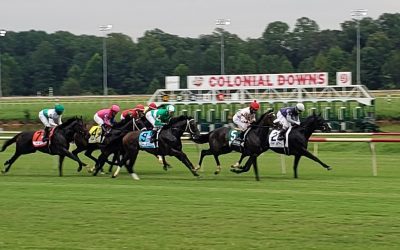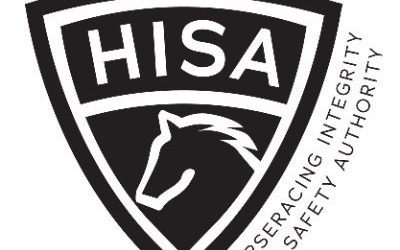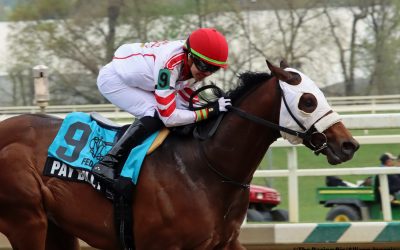Sides spar in Horseracing Integrity Act hearing

H.R. 1754, the Horseracing Integrity Act of 2019, is a critical and urgent priority that’s absolutely essential to the survival of the Thoroughbred industry.
Or it’s basically irrelevant and duplicative legislation that leaves in place – in fact, completely ignores – the industry’s biggest challenge.
Or it’s a modest step forward that doesn’t come close to addressing the full scope of equine safety and welfare needs.
The January 28 hearing of the Consumer Protection and Commerce Subcommittee of the U. S. House of Representatives’ Energy and Commerce Committee won’t likely change many minds – on Capitol Hill or elsewhere – but it did provide a helpful encapsulation of the range of views towards the proposed legislation, and it laid bare the divisions that persist within the industry.
The bill, which has more than 220 cosponsors in the House – more than half of the members of the chamber – would put a newly created “Horseracing Anti-Doping and Medication Control Authority,” managed by the US Anti-Doping Agency, in charge of medication rules, testing, and punishment in horse racing. It also would prohibit the use of raceday medications, including furosemide (Lasix).
The bill, said Rep. Paul Tonko (D-NY), is about “how we can ensure that the Sport of Kings continues to thrive into the future.” The sport, he added, is at an “inflection point… The horseracing industry could choose the more difficult step of action.”
The hearing, and its attendant legislation, took place in the shadow of the dozens of equine deaths that have occurred in recent months at Santa Anita Park – an epidemic that has given renewed energy to the bill’s advocates and pushed the question of the industry’s future into the public’s eye.
“This will reduce breakdowns,” claimed Rep. Andy Barr (R-KY), who, with Tonko, is one of the bill’s lead sponsors.
Marty Irby, executive director of Animal Wellness Action, pointed out that the rate of equine fatalities in American Thoroughbred racing is twice that in many other racing jurisdictions, while Joe De Francis, former CEO and owner of the Maryland Jockey Club and current Chairman of the Humane Society’s National Horseracing Advisory Council, portrayed the bill as of the greatest urgency.
“It is not an overdramatization to say that the very future of this industry, the survival of the business, is at stake,” he said in testimony, adding later, during the questions-and-answers portion of the two-hour-plus hearing, “We have been fiddling while Rome has been smoldering. Now Rome is engulfed in flames and an absolute inferno… This problem has reached crisis proportions.”
Yet while all of the hearing’s seven witnesses agreed that industry is facing unprecedented challenges in terms of public perception, not everyone was on board with this legislation, or even with the concept of federal intervention.
“I think federal legislation is the wrong way to go,” Dennis Drazin, Chairman and CEO of Darby Development, which operates Monmouth Park, told the panel.
And Ed Martin, president and CEO of the Association of Racing Commissioners International, argued that the proposed bill was missing the point altogether. If lack of uniformity is the concern, he told the panel, the easiest solution is not the creation of a new organization with no horseracing experience or expertise but simply incorporating ARCI rules by reference as a requirement of participation in the Interstate Horseracing Act, which permits simulcasting.
Martin, whose organization represents state racing commissions, said that racing’s problem is not “doping.”
“The real problem is dead horses,” he told the panel.
And, given that the overwhelming majority of horses that break down on the racetrack have pre-existing conditions that lead to their demise, he said, “The regulatory framework has a gaping hole: horses not under the jurisdiction of a state commission.”
The care, medications, and procedures those horses – particularly younger horses prior to their careers – undergo are largely unregulated and may undermine their long-term well-being. One recent example is the use of bisphosphonates in younger horses, a practice now considered extremely detrimental but generally occurring outside of any racing body’s jurisdiction.
It’s a problem, Martin argued, that Congress can – and for the sake of the industry, must – solve.
“Immediate and sweeping action is needed,” he said.
Another issue that occupied considerable attention is that of furosemide (commonly, Lasix), the anti-bleeder medication. The bill would prohibit its raceday application.
Some on the panel, among them Hall of Fame jockey Chris McCarron, testified that they believe the medication, which acts as a diuretic, is in widespread use because, since it causes horses to lose upwards of 20 pounds in water weight, it also may serve to enhance performance.
But Dr. Kathy Anderson, a veterinarian and the 2016 president of the American Association of Equine Practitioners, responded that Lasix is therapeutic, and its use is disclosed to all participants. She added, while it may be “common sense” that the use of Lasix and the attendant weight loss improve performance, the science has never confirmed that.
Monmouth’s Drazin had a more bottom-line concern.
“If you ban Lasix, my track, Monmouth Park, we probably don’t survive,” he said, because the reduction in available horses would be its death knell.
Drazin said that he and members of the National Thoroughbred Racing Association have been working towards “a consensus bill that’ll be better for the industry.”
Anderson, the veterinarian, called for a more thoroughgoing approach to equine safety, one that would encompass a much broader range of issues.
“The real need for uniformity expands beyond doping and medication,” she said, into issues such as track surfaces, injury responses, and veterinary practices.
And Rep. Frank Pallone (D-NJ), chairman of the full Energy and Commerce Committee, told the group that he’s “committed to working with all stakeholders” to increase safety.
“I’m optimistic we can work together to build a consensus approach,” he said.
But Rep. Tonko, one of the bill’s lead sponsors, suggested that the industry was dithering rather than confronting its problems – and indicated his own patience was running out.
Bill Lear, vice-chairman of The Jockey Club, added that prior efforts – including, in his estimation, the National Uniform Medication Program – “have failed.”
Given the range of viewpoints – and the failure thus far of this legislation or any other approach to gain industry consensus – the bill faces an uncertain future, as does the industry itself.
Yet while there was disagreement among panelists about the proposed bill, the wisdom of courting federal intervention, the desirability of prohibiting Lasix, and just about every other issue touched on, there was unanimity on one matter.
“Many in the industry believe they are staring at the abyss,” Lear said in his testimony.
And that’s a point with which no one disagreed.
LATEST BUSINESS NEWS
Frustrations laid bare at MTROA meeting
In its first public meeting since the state legislature voted for its demise, members of Maryland’s MTROA sparred as frustrations were laid bare.
Smarty Jones leads new Hall of Fame inductees
Pennsylvania-bred Smarty Jones heads up the list of seven inductees to the national racing Hall of Fame.
Colonial: Claiming Crown preview set for Aug. 21
Colonial Downs will for the first time host a Claiming Crown Preview day on Aug. 21 featuring eight races run under starter allowance conditions.
Journalism tabbed as Preakness future wager favorite
Journalism, the likely favorite in the Kentucky Derby, is the 8-1 morning line favorite in the Preakness future wager, which opens April 25-May 3.
HISA issues equine health advisory
The Horseracing Integrity and Safety Authority (HISA) has issued an equine health advisory regarding fatal proximal forelimb fractures.
Laurel: “Preakness Preview Day” handle robust
Laurel’s “Preakness Preview Day” wagering handle was nearly double its best day of 2025 to date.














